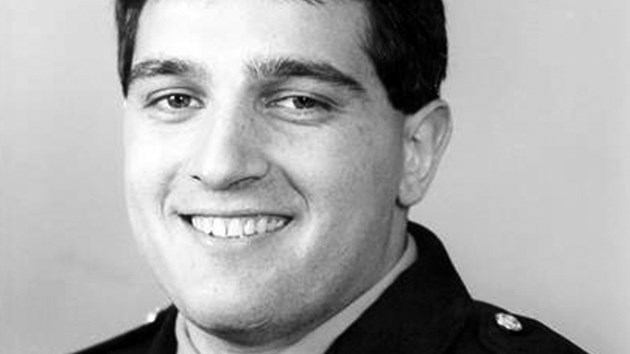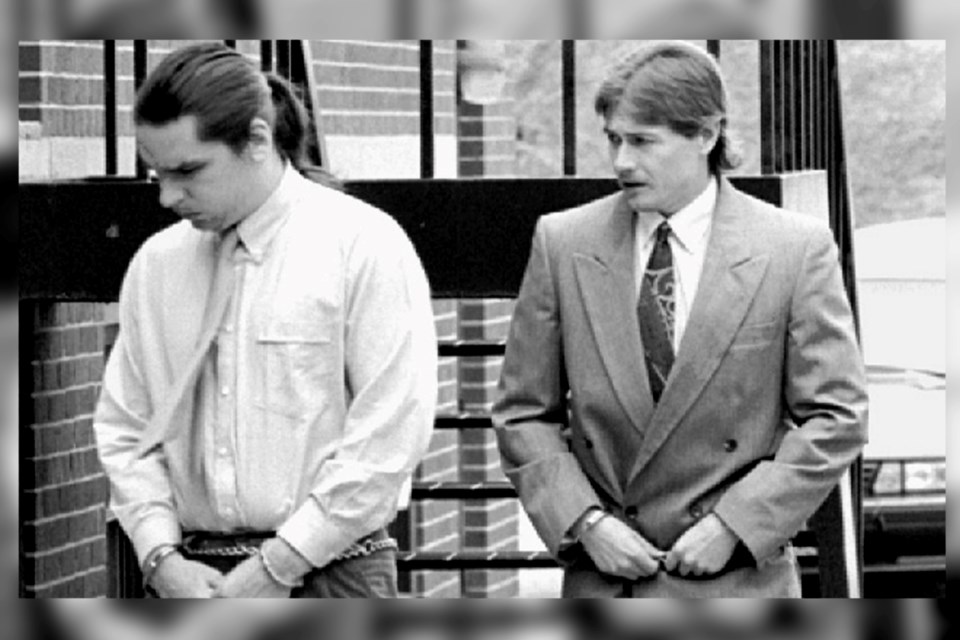One of the most notorious men in Greater Sudbury’s criminal history has died.
The Correctional Service of Canada has confirmed to Sudbury.com that Clinton Suzack, who was serving time for the 1993 murder of Sudbury Police Const. Joe MacDonald, died of apparent natural causes on Feb. 18.
A post-mortem has not yet confirmed the cause of death. He was 58 or 59 years old (exact age is unclear).
Suzack is one of two men convicted of murdering MacDonald, a young officer making a routine traffic stop in New Sudbury on Oct. 7, 1993. Also charged and convicted was a man named Peter Pennett.
Together, they ambushed, pistol-whipped and fatally shot MacDonald. They were convicted of first-degree murder in 1995 and sentenced to life imprisonment with no chance of parole for 25 years. Suzack has been incarcerated since March 4, 1995.

The murder of Const. Joe MacDonald
Suzack in particular had a history as a violent offender, and had recently been released on parole. The pair had illegal drugs in the car when MacDonald pulled them over for what he thought was a routine traffic stop.
The 29-year-old — who, with his wife, Nancy, had two young children — had no idea what he was about to face.
Pennett was driving that night, with Suzack, who was wanted on a parole violation, in the passenger seat. MacDonald pulled them over on Gordon Street in New Sudbury.
The reason his guard was down when MacDonald pulled over the two men, it emerged later, had to do with the communications system in use by Sudbury Police at that time, a communications system that had gaps in service, meaning the constable didn’t know what he was walking into.
The system was upgraded as a result of MacDonald’s murder.
MacDonald pulled the car over and approached the vehicle. As he began filling out the ticket, he was attacked. It was vicious.
MacDonald emptied his six-shot, .38 revolver, striking Suzack twice in the chest and Pennett once in the hand. It didn’t stop what was about to happen.
The men mercilessly beat the officer and pistol-whipped him, before shooting him dead.
A badly wounded Suzack and Pennett were able to flee. After a foot chase, they were captured and, two years later, convicted of first-degree murder. Both men are serving life sentences without parole for 25 years.
The spotty communications system was not the only thing about the local police service that changed after the constable’s killing. MacDonald's six-shot, .38 calibre revolver was no match for the firepower his killers were carrying. While he emptied his weapon and wounded his Suzack and Pennett, the revolver had to be manually reloaded.
Police have since been equipped with semi-automatic handguns that are higher calibre and easier to reload. MacDonald’s wife, Nancy, lobbied for more powerful firearms and ammunition, as well as other changes, for officers in the wake of her husband’s murder.
Parole history
In February, 2022, the Parole Board of Canada granted Suzack day parole for a six-month period, but denied him full parole.
“Considering the resilience you (have) shown, your constant efforts and evolution leading to observable and measurable progress, your age, and bearing in mind the current exceptional circumstances as well as the Gladue Principles that apply, your CMT considers that the gradual and structured day parole release plan presented is a viable alternative to incarceration,” the board wrote in its decision.
“While your progress has not always been linear, the overall path has been positive.”
It was Suzack who told the board he felt full parole was still premature, telling the board at his hearing that he believes his reintegration should be gradual,
In April 2021, the board denied Suzack day parole. He appealed, and in September 2021, the appeal division affirmed the board's decision. However, the appeal division ordered a review of his case for escorted temporary absences, unescorted temporary absences or day parole within 12 months.
Information from Suzack’s parole hearings describe a troubled life. Originally from the Sault Ste. Marie area, until the age of four or five, Suzack told the board his life was good. Things took a turn, the parole board states, after a gold discovery displaced his family from their reserve.
He said his family lived in a tent for two years and when they moved into town, Suzack talked about the “culture shock” of moving into an urban environment.
He claimed he was beaten by police during an arrest at 15 that led him to be placed in non-Indigenous group homes. Separated from family and culture, he found alcohol, he said. Further family trauma, including the suicide of his sister, would keep Suzack on a dark path.
The “tough guy” image he adopted led to a string of violent incidents. He had five convictions for assault and bodily harm and eight for assault, as well as convictions for robbery, unlawful confinement and aggravated assault.
Peter Pennett
The other man involved in the murder of MacDonald, Peter Pennett, was granted day parole Oct. 6, 2023 for six months, although he was denied full parole. He is 59.
According to information provided by the board, Pennett’s criminal history dates back to 1981, and involves property and drug crimes exclusively. He didn’t have a criminal history of violence prior to the killing of MacDonald.
He told the board that illegal drug use is what precipitated the onset of his criminal history. A four-year, six-month federal prison stint in 1987 did nothing to change Pennett’s behaviour, he admitted to the board, and said at the time he took no responsibility for his decisions, seeing himself as a victim.
Pennett has maintained that he did not beat or shoot MacDonald, putting that on Suzack, who was wanted by the law at the time of the murder, but did admit taking MacDonald’s gun from him.
The board said Pennett’s attitude toward the murder, and his own culpability, has changed somewhat over time.
“You told the board that you take responsibility for what happened that day, and clarified that your accountability starts from your willingness to participate in a drug deal, your decision to be with your co-accused, and for all your choices that led to you being there at the scene of the crime,” the report states. “Had you changed what needed to change in your life, the index offence would not have happened.”
However, the board said while Pennett’s attitude toward the crime has changed, he still maintains he didn’t shoot MacDonald, despite the ruling of the Court of Appeal to the contrary. This refusal to admit to the court’s findings is a factor in their decision, the board said.
“The bottom line is that the Court of Appeal, the final arbiter, found that you were the shooter, which you deny. Therefore, although you claim to accept responsibility, that has to be moderated through the fact that you continue to minimize your role,” the board wrote. “It is also noteworthy that your denial has added to the emotional challenges the victims feel.”
While the denial is a strike against him, the board said, to his credit, Pennett has not resisted interventions aimed at preparing him to return to society.



